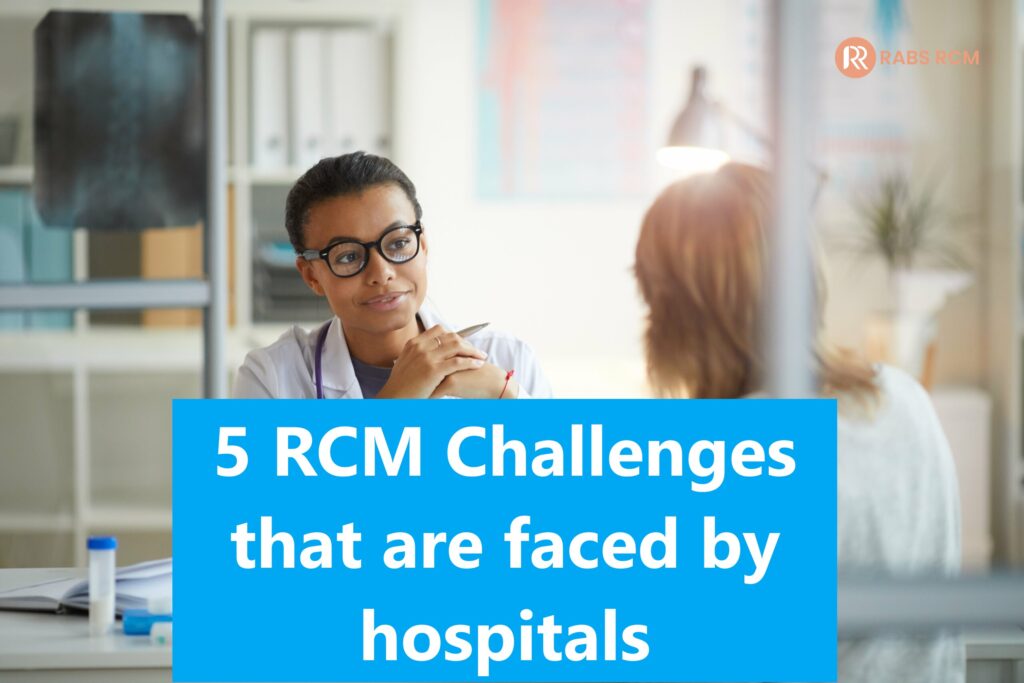Copyright © 2022 Rabs-RCM. All Rights Reserved.

5 RCM Challenges that are faced by hospitals
In the healthcare industry, new technologies can quickly alter behavior and bring about change, which gives birth to new challenges. The delivery of healthcare is a complicated process, and issues like insurance TAT and medical records all affect income. Missed visits are particularly concerning because 40% of patients said they forwent treatment. According to a poll, each of these vacant, unfilled time slots might cost up to $200 and 60 minutes. In this article, we will go through some RCM challenges that hospitals might face.
1. Adopting a Patient-centered care Approach
The phrase “patient-centred care” is used in the healthcare industry and means “patient needs are a foremost priority.” The medical billing process can be outsourced to allow healthcare practitioners to spend more time on patient care. 90% of medical practitioners who responded to an HFMA study claimed that the load of paperwork is the largest challenge facing their profession. The impact of patient-centred care on medical group practices.
According to studies, patients’ opinions are largely influenced by their interactions with insurance companies and consultations. The personnel will find it more challenging if they are focused on administrative tasks. It will be more challenging for the staff to be patient-centric because healthcare guidelines are always changing.
2. Maintaining a Constant Cash-flow
Numerous states have prohibited elective surgical procedures during COVID-19, which has resulted in a considerable drop in the amount of money available to healthcare providers. Patient-pay accounts can be difficult to collect as well. Late payments can be decreased by enforcing compliance with charge capture and reconciliation policies. Accounts receivable from services rendered previous to closure may still belong to the providers; nevertheless, many practices may find it difficult to collect these receivables.
3. Timely follow-through on claims
Some insurance companies postpone payments and occasionally send pointless refusal letters. It will be challenging to increase the reimbursement rate if the billing team is not knowledgeable about insurance guidelines and market trends. The A/R team should be in continual contact with the patient, service provider, and insurance company after filing an insurance claim in order to take the appropriate steps to resolve any claims. It will be very time-efficient to keep track of typical denials, how to fix them, and worldwide problems.
4. Workflow mismanagement
It’s not easy to manage workflow in the healthcare industry. With proper workflow, hospitals and medical offices may prevent pointless patient delays. If a patient has a negative experience as a result of a delay, the medical practice’s reputation may suffer. Patients must frequently move between desks during admission in order to organize themselves and move on to the next step. Only a small number of hospitals have medical records that have been updated and understood correctly by every clinician who has treated patients.
5. Increasing efficiency for a digital process
Most patients now utilize online searches to find information before scheduling a doctor’s appointment. According to a survey, 80% of patients would choose a doctor who offers online scheduling over one who doesn’t. It is advantageous for medical practitioners to switch to digital patient registration technologies. While implementing digital technology would necessitate the hospital installing hardware and servers and, if necessary, troubleshooting them. It can be difficult to train personnel and medical professionals on the new technologies.

- Our seamless and streamlined efforts, experience, as well as commitment to our clients, all come together to provide both you and your patients with a remarkable experience to remember.
Contact Us
- 2612 62nd St NW Rochester MN 55901 (USA)
- (507) 262-4566
- info@rabs-rcm.com

